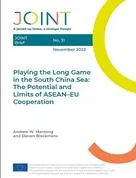Playing the Long Game in the South China Sea: The Potential and Limits of ASEAN–EU Cooperation

JOINT Brief nº 31 (November 2023)
In the South China Sea (SCS), as indeed the wider Indo-Pacific, the European Union is facing a deepening strategic rivalry between China and the United States. In the SCS, China has been able to create physical realities in defiance of international law through the construction of artificial islands in the attempt to sustain its claims to the disputed Spratly and Paracel archipelagos as well as expand its military projection deep into international waters. The US is still the predominant security player in the Indo-Pacific, but its military presence has an increasingly hard time shoring up American power in the SCS. The security dilemma between the great powers is threatening rules-based multilateralism, which runs deep in the veins of the EU and to a great extent defines its international posture.
The EU has responded to this challenge through a variety of measures, insisting on the respect for international law in the SCS and calling out China more vociferously for its incursions into exclusive economic zones of littoral states in recent years. While the EU’s position is still taken into account by regional players, it is not strong enough to shape policy outcomes according to its own interests.
In line with its Indo-Pacific Strategy, the EU should double down on efforts to address the issues that constrain international regimes in the SCS in a wider regional context. This would be aimed at levelling out the bipolar playing field within the extended nine-dash line (the term with which China refers to the perimeter of the portion of the SCS it lays claim to)1 into a more multipolar space in which it could conceivably play a greater role in shaping the rules. To that end, the EU should deepen its trade and capacity-building relations with the Association of South-East Asian Nations (ASEAN) and other regional actors through a series of economic, digital and security partnerships. This would allow both regional organisations to also widen their cooperation without getting dragged into China–US rivalry.